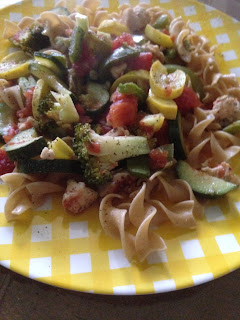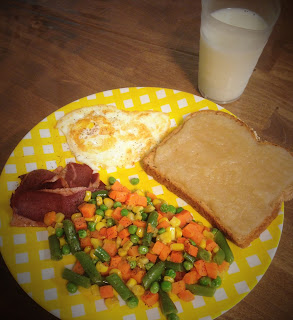Flexitarian is basically what it sounds like.
Flexible vegetarian. The base of the diet is exercise, whole grains and vegetable oils, vegetables and fruits, nuts and legumes, and then the upper categories have some poultry/fish...and if you get
really far up the pyramid, you hit pork and beef, etc.
It's also flexible because you don't have to take anything out of your diet like one of those no-carb diets, and if you are offered food from the top categories like eating at someone's house you don't have to turn it down. No need for the phrase "sorry, I'm a flexitarian."
So have I ever wanted to be a vegetarian? Personally, no. I love meat too much. However, I am totally fine with eating less meat. I grew up in Texas where barbecue is very delicious and very popular. You go to those restaurants and order tons of meat and maybe some coleslaw, corn, or potato salad. Yum! Even though I totally love that, I also really enjoy just having bits of chicken in my salad, or a couple pieces of turkey bacon instead of half of the container.
If you eat tons of meat, especially meat that isn't poultry or fish, it might be a bit of a transition for you to cut down on the meat. But it's totally worth it for your health (and your budget)! It helps you eat more of the foods in the base of the pyramid. And excess protein doesn't make you big and bulky, because your body only takes what it needs and excretes the rest.
Did you know that research has found that healthy eating reduces risk for cancer and cardiovascular disease?
"When the people who consumed the most fruits and vegetables were compared to those who ate the least, they had half the cancer risk. The studies showed that fruits and vegetables stopped cancers at almost every stage of cancer growth, and the primary protective action is believed to be from phytochemicals. Another review of this research concluded that if Americans would consume five servings of fruits and/or vegetables each day, the prevalance of cancer could be cut in half.
"Eating foods as close as possible to their natural form is the best way to protect against many of the most common forms of cancer. If you think about it, having phytochemicals concentrated in the skin [of fruits and vegetables] makes sense. Any bacteria, virus, or other plant threat has to first penetrate the skin before the plant can be harmed. The skin on simple fruits and vegetables is far more complex than we might think.
"It appears that fruits and vegetables are able to provide some protection against cardiovascular disease. If you compare the new cases of cardiovascular disease among people who eat 10 servings or more per day of fruits and vegetables with the cases among those who eat less than 2 servings, you find that those who eat a lot of fruits and vegetables have 20-30% lower risk. Findings on strokes showed that for every serving of fruits or vegetables eaten per day, women get a 3% reduction in stroke risk and men get a 5% reduction in stroke risk.
"Even high blood pressure has been successfully lowered with a diet rich in fruits and vegetables, suggesting that if you have high blood pressure, the first thing to do is to start eating more fruits and vegetables."
- Steven G. Aldana, PH.D. The Culprit & The Cure
Isn't that so amazing! I'll stop quoting research for now, but seriously the facts are there.




